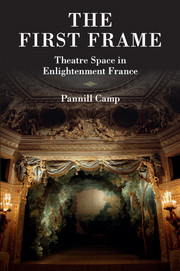Description
The First Frame
Theatre Space in Enlightenment France
Author: Camp Pannill
A unique account of the way architects, dramatists, and philosophers transformed theatre space in the eighteenth century.
Language: EnglishApproximative price 32.87 €
In Print (Delivery period: 14 days).
Add to cart
The First Frame
Publication date: 12-2017
Support: Print on demand
Publication date: 12-2017
Support: Print on demand
Approximative price 70.09 €
In Print (Delivery period: 14 days).
Add to cart
The First Frame
Publication date: 12-2014
Support: Print on demand
Publication date: 12-2014
Support: Print on demand
Description
/li>Contents
/li>Biography
/li>
In the late eighteenth century, a movement to transform France's theatre architecture united the nation. Playwrights, philosophers, and powerful agents including King Louis XV rejected the modified structures that had housed the plays of Racine and Molière, and debated which playhouse form should support the future of French stagecraft. In The First Frame, Pannill Camp argues that these reforms helped to lay down the theoretical and practical foundations of modern theatre space. Examining dramatic theory, architecture, and philosophy, Camp explores how architects, dramatists, and spectators began to see theatre and scientific experimentation as parallel enterprises. During this period of modernisation, physicists began to cite dramatic theory and adopt theatrical staging techniques, while playwrights sought to reveal observable truths of human nature. Camp goes on to show that these reforms had consequences for the way we understand both modern theatrical aesthetics and the production of scientific knowledge in the present day.
Introduction: the 'first frame' of Enlightenment theatre space; 1. The divided scene of theatre space in the Neo-classical era; 2. The theatrical frame in French Neo-classical dramatic theory; 3. Enlightenment spectators and the theatre of experiment; 4. Theatre architecture reform and the spectator as sense function; 5. Optics and stage space in Enlightenment theatre design; Epilogue: modern spectatorial consciousness; Appendix: dedicated public theatres built in France, 1752–90.
Pannill Camp is Assistant Professor of Drama at Washington University, St Louis. His research examines points of intersection between theatre history and the history of philosophy, especially in eighteenth-century France. Before joining the faculty of Washington University, he was a postdoctoral fellow at the Humanities Center at Harvard University, Massachusetts and taught in Harvard's Department of the History of Art and Architecture. At Brown University, Rhode Island, he won the Joukowski Family Foundation's Award for Outstanding Dissertation in the Humanities, and the Weston Award for theatre directing. His work has been published in journals including Theatre Journal, Performance Research, the Journal for Eighteenth-Century Studies, and the Journal of Dramatic Theory and Criticism.
© 2024 LAVOISIER S.A.S.





